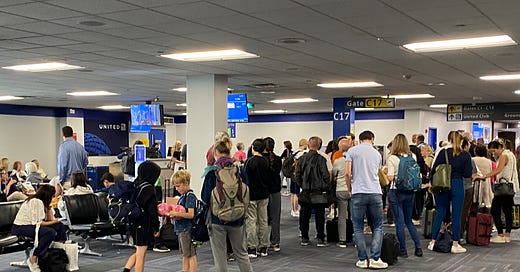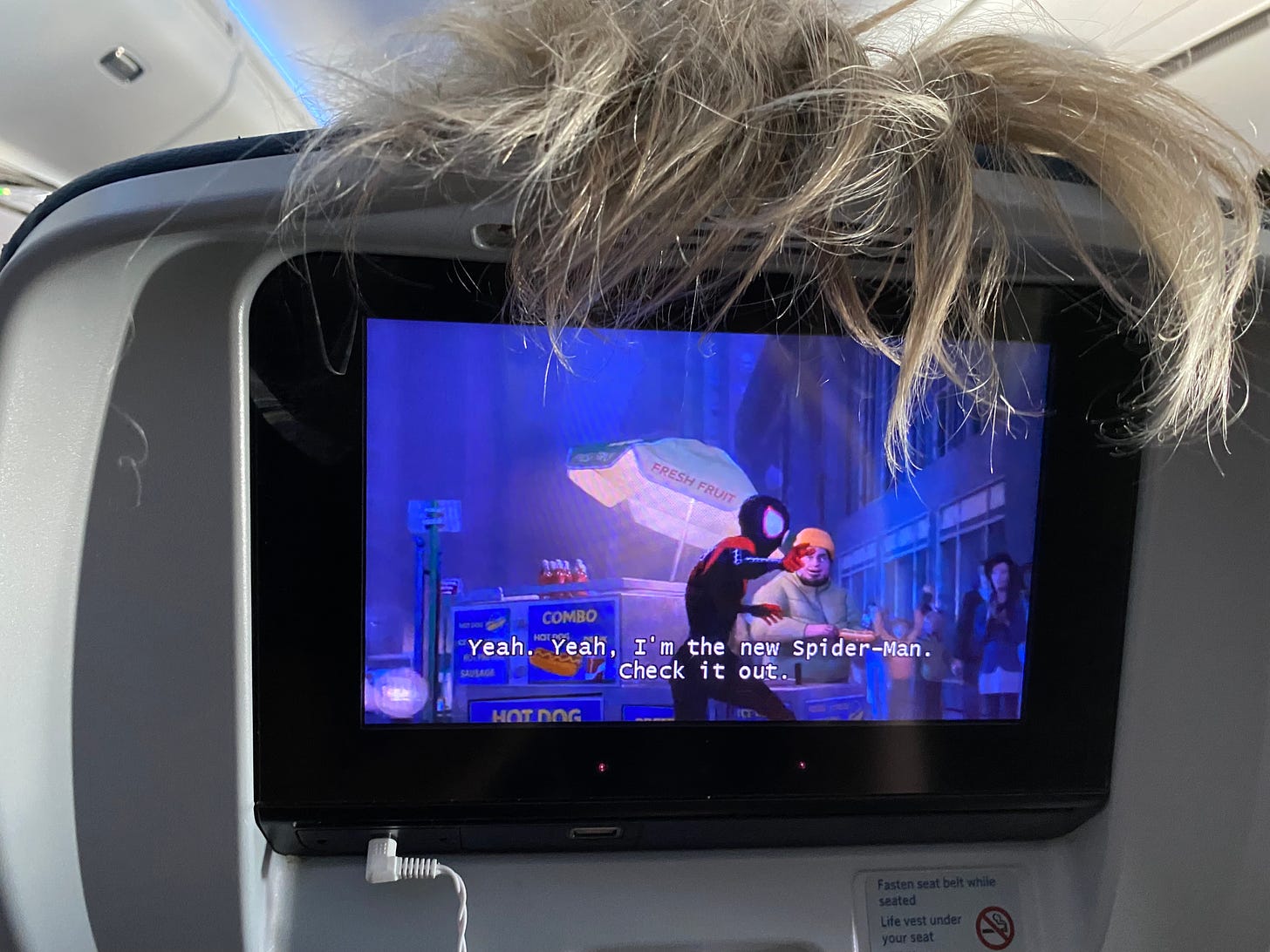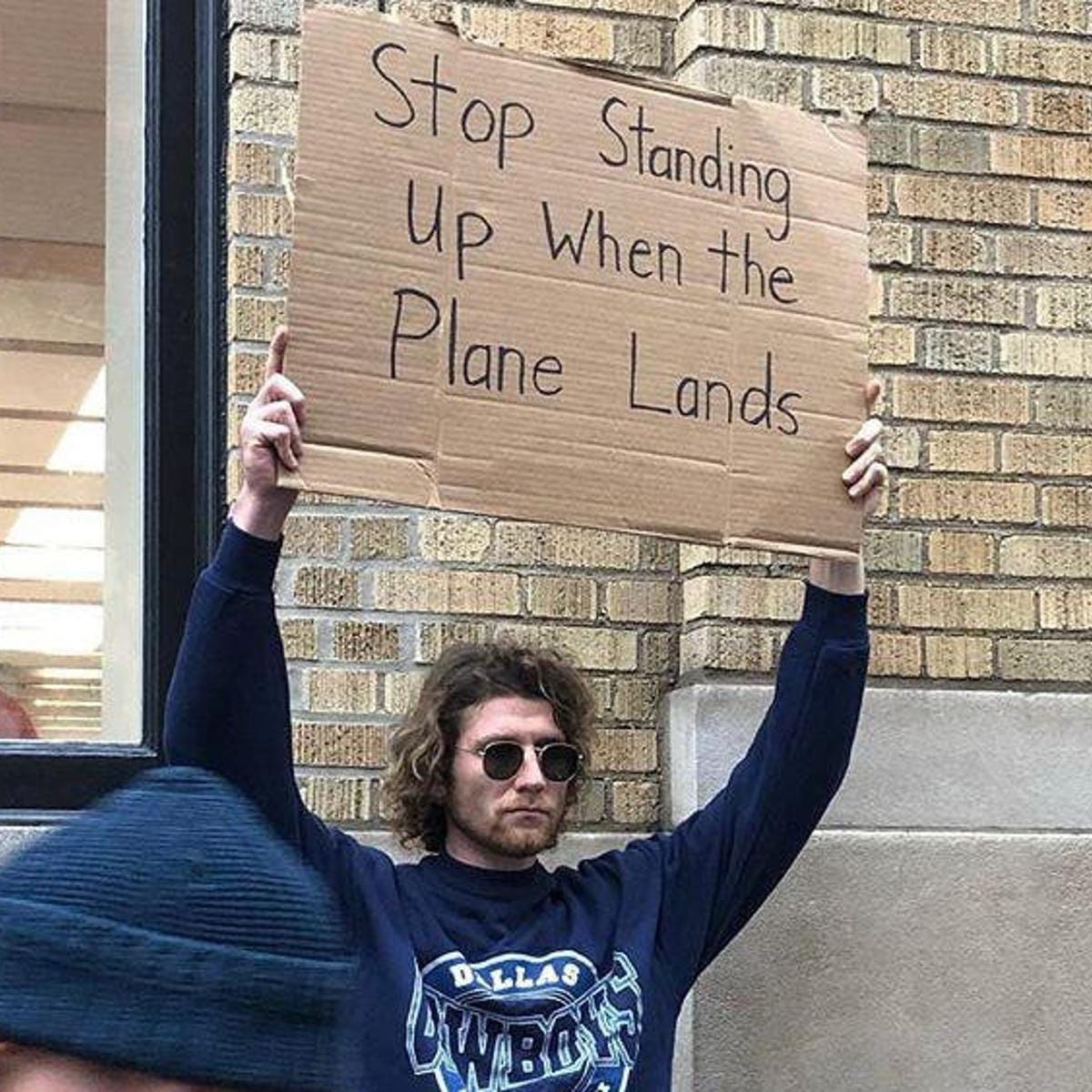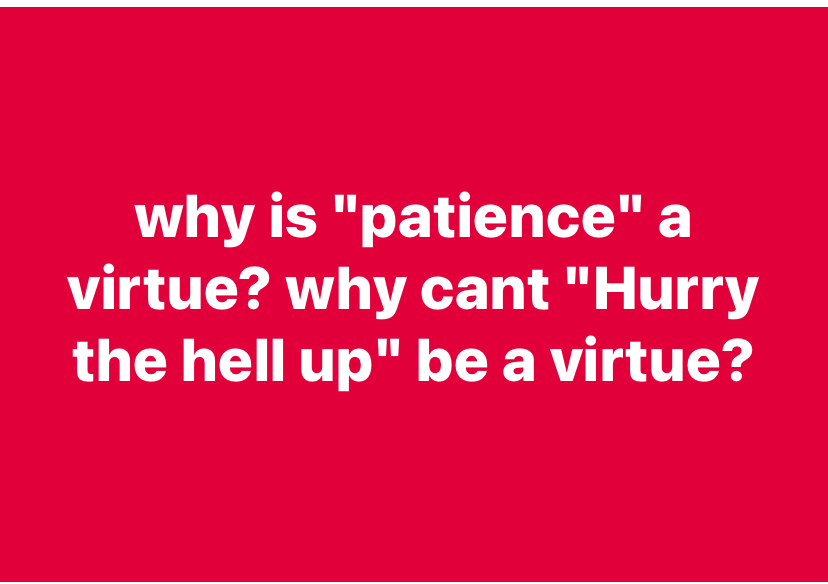Oh Honest to Pete! Just Check Your Bags!
And Other Ideas for Making Air Travel More Pleasant for Everyone
A quick reminder that our summer book club, for which we will be reading “Bartleby, the Scrivener,” by Herman Melville, will begin soon. A free version of the story is available here, or you might have a copy knocking around somewhere in your old college textbooks. The story is about forty pages long, so we will have plenty of time to read it before July. At the end of next week’s post I’ll offer some questions to think about as we read. Our discussions will take place on July 12 and 19. Thanks in advance for participating, and happy reading, everyone! Now, on to this week’s post.
This title is in honor of my mom, who is so sweet that even when she is irritated (which has been known to happen at airports), the harshest thing you will ever hear her say is “Oh honest to Pete!” Yes, my mom is adorable.
Anyway, the summer travel season is upon us, and we likely all agree that during the past few years, flying has become much less pleasant for everyone. The blame lies with the airlines themselves, of course. The seats are smaller, the planes are fuller, staffing is thinner, air traffic is heavier, and security requirements are more onerous.1 Air travel is a problem of systems, and it can feel as though individual action doesn’t matter. But in fact if we cooperate and show consideration for other people and respect for rules, we can make air travel better for everyone—in spite of those shrinking airplane seats and expanding airport crowds.
To illustrate this point, let me tell you about the best flight I ever took, at 7am on a Saturday, out of Chicago’s O’Hare Airport. The passengers were about sixty young men on leave from the Naval Station Great Lakes, and me. The time from the moment boarding began until everyone was buckled into our seats and ready to go was a mere ten minutes, and deplaning was even faster—about five minutes total. This was a full flight too (the plane was small). How is such a thing even possible? you may be wondering. Simple: The troops followed every rule, and no one tried to seize an advantage for himself at the expense of someone else. They lined up in an orderly fashion, they boarded in the order specified by the gate agent, they brought small bags that could easily fit under the seats in front of them, and they helped the lone civilian, me, with my small bag too.
Airline policies and the stress and crush of airports will prompt us toward zero-sum thinking—“If I don’t get in line ahead of that guy I will miss my flight!”—and will tempt us to be selfish and pushy. But we have the power to be as respectful and considerate as these young men were. And if we are, we will not only take pride in our virtue, but we will find that flying is easier and more enjoyable too. A win-win!
Below are some of my own ideas, as well as thoughts from friends, about what we can do at every stage of our flights to be better citizens of the air.
Be Considerate before the Flight
If at all possible, please check your bags. This one change would make the greatest improvement in air travel. Excess carry-on baggage is the main reason that security lines are so slow (all that rummaging, unpacking, and packing, multiplied by thousands of people, adds up). The bags slow down boarding too, because it takes forever for passengers to stow their bags—or they traipse back up the aisle in the vain hope of finding more storage space, or get into arguments about who gets which space, or dragoon the overburdened flight attendants into dealing with their bags.2 By contrast, if you check your bags, you can stroll around the airport unencumbered until it’s time for boarding. This is a great way to get your steps in! And then when boarding begins, instead of standing in a long, slow line, you can cool your heels until just before the doors close, when you can dart on and take your seat.
I know that the airlines aren’t helping with this issue. As I have written before, their stupid policy of charging for checked luggage and keeping carry-on free gets it exactly backwards. If people want the convenience of carry-on, they should pay for it; currently they make everyone else pay, in the form of long lines. I do sympathize with people who take excess carry-on. They are worried that the airlines will lose their bags, or that if they have a tight connection, the bags won’t make it onto the plane. But now that airlines use bar-coded tags, it is extremely rare for them to lose bags, and if they do, they have to compensate us. And if a bag doesn’t make it onto your plane, the airline has to drive it to you within twenty-four hours. This has happened to me a couple of times (out of hundreds of flights), and it’s no big deal, I promise.
Have your act together in the security line. If I ran the world, the TSA-precheck line would be reserved not for rich people who have paid for business class or Clear, but instead for anyone who has his or her act together and can move efficiently through the security process.3 I’m only partly joking. We’re standing in that line for what feels like hours—plenty of time to remember that you still have a soda in your hand, keys in your pocket, a phone in your purse, and liquids that need to go into a ziplock. The moment you are facing the TSA agent is not the time to begin unloading everything.
Don’t crowd around the boarding area. It happens before every flight: A few minutes before pre-boarding begins, people sitting in the gate area sense a disturbance in the Force, and, en masse, they cluster around the door in tight clumps. I get it. They are worried that if they don’t get on ahead of everyone else, there won’t be any space for their ginormous carry-on bags. Or they may subconsciously think that the closer they are to the door, the faster the boarding will be. But this is false: The chaos (“Is this the line? I’m in Group 3—is this Group 3? Which flight is this line for? Are you waiting or just standing?”) blocks people from getting into the proper lines and onto the plane, which slows down boarding for everyone.
And please don’t try to sneak in line before your group is called! Your group is clearly marked on your boarding pass, and the gate agents are not going to be fooled. Don’t force them to reprimand you and send you out of the line. All you are doing is slowing down the line and adding to the unpleasantness of the gate agents’ jobs.
Be a Mensch on the Plane
Use your tall privilege to help with bags. Those overhead compartments can be tough to reach on some planes. I am tall and love being asked to help the vertically challenged among us stow their bags. Kathleen, who is 5’1”, requests that we offer to help “in a nice way so you don’t make short people feel like they are little trolls.” Duly noted!
Don’t invade people’s space. Reclining is a contentious issue. In my opinion, we purchase the right to recline when we book a reclining seat, but I know that some people are bothered when the person in front of them cranks their seat back. It can help to ask politely and make self-deprecating remarks about back pain, long legs, age and creakiness, and whatnot. Most of the time people will be accommodating. Natalie adds that we should “Keep your body and belongings in your own space! It seems like every time I fly someone’s jacket is overflowing over the arm rest into my territory, or their leg or even baggage is on my side of the floor space.” (The one exception to this rule is that the person in the middle seat should get both armrests.) The same goes for long hair!
This principle extends to emotional space too. As Ty reminds us, “One shouldn’t chit-chat at people when they’re trying to sleep, watch the movie, or have headphones on. It’s fine and reasonable to interrupt for practical purposes, but constant unnecessary interruptions are frustrating.”
Little kids are people too. Every person on earth was once a little baby who shrieked and fussed and annoyed other people from time to time. Yes, you too. If there is a crying baby or whining toddler on your flight, a little patience goes a long way. Please don’t huff and grumble. And if you are so moved, I can attest that, as someone who has flown many times with my kids, a friendly word of support—or an offer to hold the baby while the mom takes her big brother to the potty—will mean the world to beleaguered parents.
Parents, for their part, can do a lot to minimize the irritation to the other passengers. As with reclining, I don’t get why seat-kicking rankles so much, but it does, so it is incumbent on us parents to put a stop to this behavior. The good news is that if you have a seat-kicker, you can solve the problem with one simple expedient: Remove your child’s shoes the second s/he is buckled in. It’s no fun to kick a seat if you stub your toe! And if you have a fussy baby or restless toddler, it helps to take them for a walk up and down the aisle. Ask me how I know this. Alternately, long flights are no time to be a screentime Puritan: Let your kids watch anything they want, even Peppa Pig or some other annoying show you wouldn’t tolerate at home. Finally, if all else fails (shh! this is our secret!), there’s always Benadryl.
Treat the flight attendants with respect and thank them profusely. But you were already doing this, right?
The End of the Flight Should Not Resemble an MMA Cage Match
Let’s leave the cage matches to the likes of Elon Musk and Mark Zuckerberg, shall we? The rest of us are capable of behaving like civilized, rational beings, even in the frenzy to get off the plane and on with our lives. This shaggy gentleman has some good advice:
If we stay in our seats until the row ahead of us files out, we will have time to finish that Sudoku, make that phone call, or read another chapter. Plus, deplaning will be faster for everyone. If we don’t have a connection to make, or if we are on the slow side, it is especially thoughtful to wait in our seats until everyone else is off the plane. Most important, if your bag was stowed in a different row from your seat, don’t go blundering around trying to retrieve it while everyone else is trying to get off. Just wait until the aisles are clear. If you had listened to me and checked your bag in the first place, you wouldn’t be in this mess.
Be patient with poky walkers. If it isn’t already apparent, I find it frustrating to be stuck behind slow people in airports, especially if I’m racing to make my connection or to catch a train home. Thoughts like “moseying, sluggish, lackadaisical, lollygagging, Sunday driver” (and, for that matter, “poky walker”) are running through my head whenever slow people obstruct me from running through the concourse.
But Kathleen has an important reminder for us impatient types: “You don’t always know why people may go slower. My husband had severe leg injuries in Vietnam but could walk. He wasn’t poky on purpose. He did the best he could.” When we are being blocked by someone slow, it can help to view them with compassion instead of judgment. What do we notice about them that might explain their pace? Are they limping? Or overweight and probably suffering from painful knees and feet? Or disabled? Or old? Or burdened by exhausted kids and their many accessories? That might have been us once, or it might be us one day. If we make ourselves see the humanity in slower people, we will be unwilling to shove them aside or brush past them. We might even consider lending them a hand.
The slower people among us can do their bit too. If you are a mellow, laid-back, Type B kind of person, I admire and envy you. You are probably happier and healthier than the rest of us, and your relaxed attitude likely doesn’t even cause you to miss all that many flights. But please keep a space in your heart—and in the airport hallways—for the speedy, stressed-out, anxious people stuck behind you. If you know you need more time to get around for whatever reason, it is considerate to keep to one side in narrow corridors, on moving walkways, and on escalators, so that people have room to pass you. Even better, if you have a health condition that makes walking difficult, you can request a wheelchair or cart (here’s how). Our family has done this for our daughter, who is disabled. Ordering a chair or cart takes some planning and requires some waiting around, but these accommodations vastly improve the journey through the airport.
And finally, Sarah has some advice for those of us who were clever enough to check our bags:
Stand six feet back from the baggage carousel. Step forward at such time as you see your bag and it is approaching you, and not before. You will not summon the bag to appear more quickly by standing with your knees against the carousel getting in the way of everybody trying to see their own bag.
How about you, readers? If you could wave a magic wand, what rules would you put in place to make the experience of flying more pleasant? Please share your thoughts and ideas in the comments!
The Tidbit
In case you are on a flight where the passengers are getting contentious or there are therapy dogs or lots of kids, you might find this chart useful. Tee hee!
Did you know that in Europe you don’t have to remove your shoes to go through security? And yet in spite of Europeans’ devil-may-care attitude about the lurking dangers of shoes, no one has ever detonated a shoe-bomb on a European flight. For that matter, in the US people who can afford to pay for business class or Clear don’t have to take their shoes off either. Maybe the TSA could dispense with this needless requirement for the rest of us too?
This is a labor issue. Flight attendants and gate agents are bearing the costs of the airlines’ decision to charge for checked luggage while keeping carry-on free. Most flights these days are almost entirely full, and the overhead compartments were never designed to accommodate large bags for every single seat. So the flight attendants and gate agents have to spend a frantic hour before takeoff begging people to gate-check their bags and engaging in a game of Tetris trying to wedge in all the bags that remain. Even worse, the flight attendants aren’t paid for this time and labor; their pay begins when all the carry-on is stowed and the plane door is closed. If you care about conditions for workers, you should check your bag.
I have a similar opinion about bathrooms, incidentally. In Europe, it is common for bathrooms to be unisex, and it works fine, so the panic over trans women in bathrooms seems unfounded to me. But I would LOVE to see bathrooms segregated according to tidiness: Do you pee all over the toilet seat (my male readers would be shocked to know how common this disgusting behavior is in the women’s bathroom)? Do you neglect to flush? Do you splash water all over the floor and leave dirty paper towels everywhere? Get thee to the yucky bathroom, and leave the clean one to the rest of us!









I think the issue is more complicated. Although I do agree with the root problem, that airlines are allowed to charge for checking one bag. I would totally support a federal law that requires airlines to check one bag for free. Period.
Of the rest, there are different motivations. One group simply needs (or wants) to fly as cheaply as possible, so the $50 charge for a bag motivates to use carry-on. For them, they could use the free gate-check option when it's presented. That's what I do when destination time or connections are not a problem (see below.) This doesn't help with security though.
You mentioned the short connection and those who fear losing their bags. The "don't worry because of 24-hour delivery" option is only valid if you're actually staying at your final airline destination. If you're traveling from there by car or train, it becomes way more difficult to reconnect. Personal experience with this one.
Another group does carry-on because they are rushing through the day, ususally for business. Having to wait for a checked bag can add an hour to ones destination. Sometimes this is not at all convenient. When this was me, I would pack a very small under-the-seat pack, to be sure that the airline wouldn't force me to check it.
Finally, there's the terrible class system. Those who get on the plane first can bring their bags. Those at the end of the line might be forced to check, and believe me, I've seen cabins with only half the bins full, and the attendents declare "NO MORE BAGS" and force everyone in the second half of the boarding to check. It's insulting and maddening. I've written letters. It clearly underlines which class of person you are, the ones who get treated with some particle of respect, and those who are just flying cattle. I've taken to paying for priority seating just for this reason. I hate having to get on the plane early, but it's worth it if I need to bring my bag. Fixing the problem with money.
I wasn't aware of the point of flight-attendents only getting "paid" starting from when the doors close. This might explain the half-bin experience. It also explains some times when you rush to get seated, then the pilot announces that we're too early and have to sit at the gate for another 30 before we can depart. Ugh. But at least the flight-attendents are getting paid for that time.
Hahaha the hey buddy guide is hilarious.
I prize our freedom but boy do I wish more of us westerners would voluntarily submit ourselves to orderly and considerate group behavior in public/crowded situations.